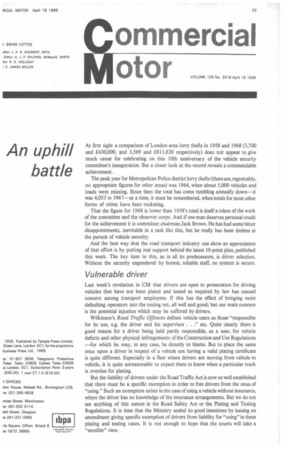An uphill battle
Page 25

If you've noticed an error in this article please click here to report it so we can fix it.
At first sight a comparison of London-area lorry thefts in 1958 and 1968 (3,700 and £430,000, and 3,569 and £811,820 respectively) does not appear to give much cause for celebrating on this 10th anniversary of the vehicle security committee's inauguration. But a closer look at the record reveals a commendable achievement.
The peak year for Metropolitan Police district lorry thefts (there are, regrettably, no appropriate figures for other areas) was 1964, when about 5,000 vehicles and loads went missing. Since then the total has come tumbling annually down—it was 4,053 in 1967—at a time, it must be remembered, when totals for most other forms of crime have been rocketing.
That the figure for 1968 is lower than 1958's total is itself a token of the work of the committee and the observer corps. And if one man deserves personal credit for the achievement it is committee chairman Jack Brown. He has had some bitter disappointments, inevitable in a task like this, but he really has been tireless in the pursuit of vehicle security.
And the best way that the road transport industry can show an appreciation of that effort is by putting real support behind the latest 10-point plan, published this week. The key item in this, as in all its predecessors, is driver selection. Without the security engendered by honest, reliable staff, no system is secure.
Vulnerable driver
Last week's revelation in CM that drivers are open to prosecution for driving vehicles that have not been plated and tested as required by law has caused concern among transport employees. If this has the effect of bringing more defaulting operators into the testing net, all well and good; but our main concern is the potential injustice which may be suffered by drivers.
Wilkinson's Road Traffic Offences defines vehicle users as those "responsible for its use, e.g. the driver and his supervisor . . ." etc. Quite clearly there is good reason for a driver being held partly responsible, as a user, for vehicle defects and other physical infringements of the Construction and Use Regulations —for which he may, in any case, be directly to blame. But to place the same onus upon a driver in respect of a vehicle not having a valid plating certificate is quite different. Especially in a fleet where drivers are moving from vehicle to vehicle, it is quite unreasonable to expect them to know when a particular truck is overdue for plating.
But the liability of drivers under the Road Traffic Act is now so well established that there must be a specific exemption in order to free drivers from the onus of "using." Such an exemption exists in the case of using a vehicle without insurance, where the driver has no knowledge of the insurance arrangements. But we do not see anything of this nature in the Road Safety Act or the Plating and Testing Regulations. It is time that the Ministry sealed its good intentions by issuing an amendment giving specific exemption of drivers from liability for "using" in these plating and testing cases. It is not enough to hope that the courts will take a "sensible" view.
































































































































